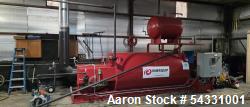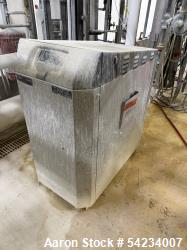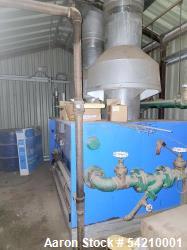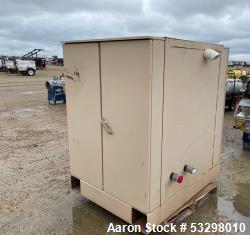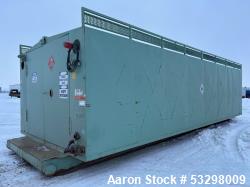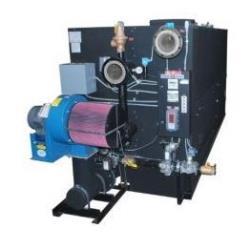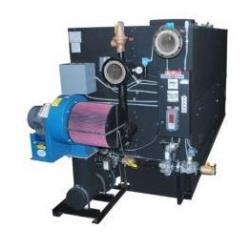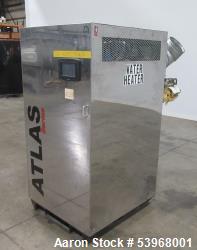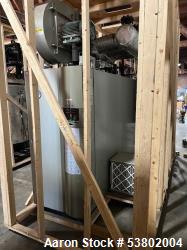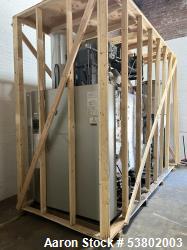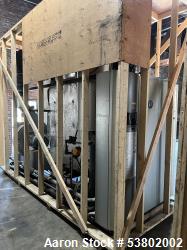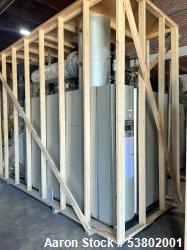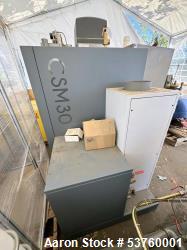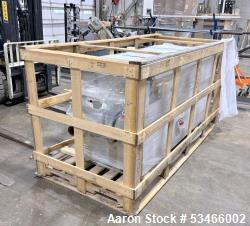Used Boilers – Industrial Boiler Inventory
Aaron Equipment buys and sells reconditioned, unused, and used boilers. Boilers are used to create steam by applying heat energy to water. Industrial boiler systems generally fall into two categories: hot water and steam.
Both commercial boiler systems are similar in nature and feature a cylinder tube known as a pressure vessel. The pressure vessel contains a flame tube, which is fired through a burner. Industrial boilers operate through a combustible reaction between fuel and air. The heat from this combustion is then passed from the tubes that are submerged in water. The water is then evaporated into steam which is taken into piping systems to be used in the heating process.
Hot water boilers use pumps to move the heat through the system, while steam boilers transport the heat based on inherent pressure.
Aaron's industrial boilers include fire tube boilers, hot oil boilers, waste heat boilers, and water tube boilers that are produced by manufacturers such as Bryan, Clayton, Cleaver Brooks, Columbia, Fulton, Metalfab Inc., Parker, and Watlow Process Systems. Commercial industrial boilers are used in the Cement, Chemical, Distillery, Food, Pharmaceutical, Pulp and Paper, Refinery, Rubber, Steel, and Textile industries.
Aaron Equipment offers previously used boilers that are much less expensive than new, offer ease of payment, and have a much faster delivery time. If you are looking to sell your used boiler please contact Erik Eichert at 630-238-7480.
Your Guide To Industrial Boilers
Industrial boilers are crucial in many industries. They generate steam or hot water, powering a wide range of processes.
But what exactly are industrial boilers?
This guide will explore the world of industrial boilers, including different types, including hot oil, fire tube, and water tube boilers and the factors to consider when choosing a boiler and touch on efficiency and maintenance strategies. This guide is for facility managers, engineers, and business owners. Let's demystify industrial boilers together.
Introduction to Industrial Boilers
Industrial boilers, as you know, are essential for energy production in many sectors. They provide the necessary steam for various operations, from manufacturing to food processing. These boilers come in different types, each designed for specific applications. Hot oil, fire tube, and water tube boilers serve unique functions. Choosing the right type not only depends on your needs and industry demands but also on the environmental impact you want to make.Selecting an industrial boiler involves careful consideration. Efficiency, size, and compliance with regulations are crucial factors. A well-chosen boiler ensures safe and effective operation, reducing costs and improving productivity.
Understanding Boiler Types
Industrial boilers come in various types, each with distinct designs and functionalities. Their applications are specific, making it necessary to understand the details of each type. Hot oil boilers, fire tubes, and water tube boilers are among the most common. Each serves a different purpose and industry requirement. Knowing which type suits your needs can significantly enhance operational efficiency.
- Hot oil boilers are ideal for high-temperature operations where steam is not suitable. Fire tube boilers are more common in low- to medium-pressure applications. Meanwhile, water tube boilers handle high-pressure tasks efficiently.
- Both fire tube boilers and water tube boilers have their pros and cons. Fire tube boilers are simple and easy to maintain but take longer to start up. Although more complex and costly, water tube boilers offer quicker start times and higher efficiency.
A detailed evaluation of these boilers is not just recommended, but crucial. This includes understanding their designs, operating capacities, and typical use cases. Doing so can ensure the best match for your industrial processes and energy needs, making you feel thorough and diligent in your decision-making process.
- Hot Oil Boilers utilize thermal fluids instead of water or steam. They are perfect for processes that demand precise temperature control. Their main advantage is the ability to reach high temperatures without high pressure, thereby reducing the risk of accidents. Common in chemical, textile, and asphalt industries, they excel where steam boilers cannot operate effectively. Their design ensures minimal thermal degradation.
- Fire Tube Boilers are a popular choice due to their simplicity. They consist of a series of tubes immersed in water, through which hot gases pass. These boilers are well-suited for small to medium industrial operations and favored for their straightforward design and ease of use. Fire tube boilers are most efficient in applications that do not require rapid steam demand changes. However, they take longer to respond to load changes than other types.
- Water Tube Boilers offer a different approach by housing the water within tubes. These tubes are heated externally by the fire. This design is beneficial for high-pressure applications. It allows them to produce steam quickly and efficiently. Water tube boilers are standard in power generation due to their ability to handle enormous output demands. They are also more compact, saving valuable space. Despite higher costs, their efficiency and quick start-up make them a preferred option for demanding industries.
Selecting the Right Boiler
Choosing the correct boiler is crucial for efficient operations.
- The first aspect to consider is the boiler size. An undersized boiler may struggle to meet demand, while an oversized one wastes energy.
- Efficiency is another key factor. High-efficiency boilers help reduce fuel costs, which can positively affect operational expenses. Check the boiler's energy rating and compare your options.
- The type of fuel you use also impacts your decision. Natural gas, oil, and electricity each have different costs and availability. Assess what makes the most sense for your facility.
- Consider the boiler's operating pressure. Different processes require varying pressure levels, so ensure your choice meets your needs, including safety and performance optimization.
- Don't overlook the importance of installation and footprint. Space constraints limit some options, and the complexity of installation could influence costs. Ensure that the installation area is adequate.
- The cost is more than just the purchase price. Assess lifecycle costs, including maintenance, repairs, and spare parts. Factor these into your budget to get a comprehensive understanding of expenses.
- Also, evaluate the manufacturer's reputation. Reliable brands offer better warranties and service support, which can be invaluable in the long run. Understanding the manufacturer's reputation is not just about the product, but the ongoing support and service you can expect.
- Finally, consult industry standards and regulations. Ensure the boiler meets compliance requirements. This adherence can prevent future legal complications and ensures operational safety.
Boiler Efficiency and Maintenance
Boiler efficiency and maintenance are vital for any industrial operation. A high-efficiency boiler lowers fuel usage, trimming down operational costs. Regular assessments identify areas for improvement, enhancing overall performance. Efficient boilers aren't just about reducing expenses, though. They also minimize emissions, aligning with environmental regulations. This balance between productivity and sustainability is increasingly important in today's industries. However, efficiency can degrade over time. Without proper upkeep, your boiler might lose its initial efficiency rating, underscored by the need for regular maintenance and upkeep. Both efficiency and maintenance contribute to a boiler's longevity. Proper care prolongs its life, giving you more value from your investment. This extends the machine's usability well into the future. Regular maintenance is not just a cost, but an investment in the future of your operations.
- Boiler Efficiency critically impacts your fuel bills. A few percentage points in efficiency can translate to significant savings over time. Efficiency assessments let you measure these improvements accurately. Conducting an assessment begins with analyzing energy input versus output. This often involves measuring fuel consumption under different load conditions. You should also monitor thermal losses through the flue gas. Moreover, regularly inspect and clean heat exchangers. Soot or scaling buildup can drastically reduce thermal efficiency. Keep these surfaces clean to improve heat transfer rates. Additionally, consider upgrading outdated controls and systems. Modern control systems optimize the combustion process, further increasing efficiency. These minor tweaks can deliver noticeable results.
- Routine Boiler Maintenance is essential for safe and reliable boiler operation. Start with a daily visual inspection. Look for leaks, unusual noises, or other anomalies indicating issues. Annually inspect safety valves and pressure gauges. These components ensure the boiler operates within safe parameters. Faulty parts can lead to dangerous conditions, so replace them promptly. Water quality also requires attention. Poor quality can lead to corrosion and scale buildup, which harms the boiler and requires regular feedwater treatment.Lastly, monitor and record operation data. Trends in temperature, pressure, and fuel consumption can flag issues early. Address these problems before they escalate.
Safety and Compliance
Boiler safety is paramount in industrial environments. Neglecting safety protocols can lead to catastrophic failures, which could result in injury, property damage, or even death. Adhering to regulatory standards is the first step in ensuring the safety of industrial boilers. Many countries have stringent guidelines for boiler operations, and compliance with these standards safeguards the equipment and human lives. Certifications play a critical role in this process. Boilers and their components must meet specific certification criteria, which affirm that the equipment meets the necessary safety and performance standards. Operators should undergo thorough training to understand these standards. Proper training empowers operators to manage the boiler safely and efficiently, minimizing the risk of errors that could lead to accidents. Routine inspections are another cornerstone of boiler safety. They verify that all safety components are functioning correctly and help identify potential problems before they escalate.Testing of safety devices, such as pressure relief valves, is essential. These devices prevent overpressure by releasing excess steam. Failing to test these mechanisms can result in dangerous pressure buildups. Documentation of all maintenance and inspections is necessary for compliance. This documentation provides a clear history of the boiler's condition and maintenance. Regulatory bodies often require these records during audits. Incorporating advanced technologies like automation can further enhance safety. Automated systems can monitor and control various operational parameters in real-time, minimizing the chances of human error and boosting overall safety.
This industrial boiler guide covers the types and functions that allow operators to make informed choices. Selecting the right boiler impacts both efficiency and operational costs. Ensuring proper maintenance and compliance with safety standards cannot be overstated. Prioritizing these elements leads to optimal performance and longevity. By staying informed about advancements and regulations, industries can maintain safe, efficient operations. This knowledge safeguards equipment and personnel, enhancing productivity and safety across industrial settings.
